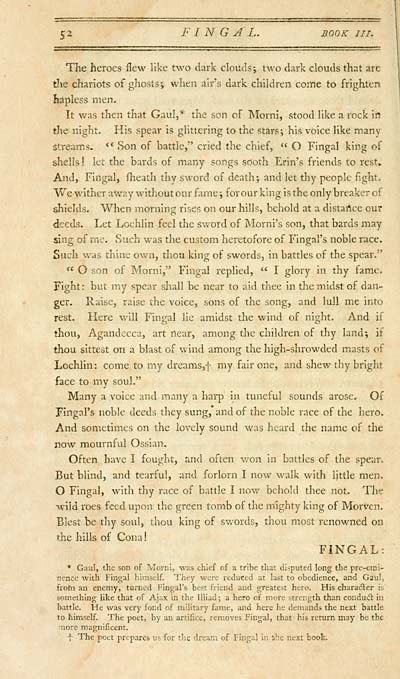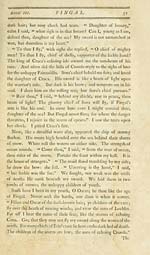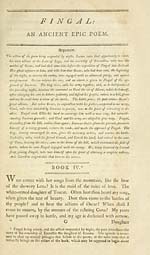Download files
Complete book:
Individual page:
Thumbnail gallery: Grid view | List view

F I N G A L.
The heroes flew like two dark clouds; two dark clouds that are
tlie chariots of ghosts; when airs dark children come to frighten
hapless men.
It was then that Gaul,* the son of Morni, stood like a rock in
the night. His spear is glittering to the stars; his voice like many
streams. '* Son of battle," cried the chief, " O Fingal king of
shells ! let the bards of many songs sooth Erin's friends to rcst»
And, Fingal, fheath thy sword of death; and let thy people fight.
"We wither away without our fame ; for our king is the only breaker of
shields. When morning rises on our hills, behold at a distartce our
deeds. Let Lochlin feel the sword of Morni's son, that bards may
sing of me. Such was the custom heretofore of Fingal's noble race.
Such was thine own, thou king of swords, in battles of the spear."
" O son of Morni," Fingal replied, " I glory in thy fame.
Fight : but my spear shall be near to aid thee in the midst of dan-
ger. Raise, raise the voice, sons of the song, and lull me into
rest. Here will Fingal lie amidst the wind of night. And if
thou, Agandecca, art near, among the children of thy land; if
thou sittest on a blast of wind among the high-shrowded masts of
Lochlin: come to my dreams,-}- my fair one, and shew thy bright
face to my soul."
Many a voice and many a harp in tuneful sounds arose. Of
Fingal's noble deeds they sung,* and of the noble race of the hero.
And sometimes on the lovely sound was heard the name of the
now mournful Ossian.
Often have I fought, and often v/on in battles of the spear.
But blind, and tearful, and forlorn I now walk with little men.
O Fingal, with thy race of battle I now behold thee not. The
wild roes feed upon the green tomb of the mighty king of Morven.
Blest be thy soul, thou king of sv/ords, thou most renowned on
the hills of Cona !
FINGAL:
♦ Ga-ui, the son of Morni, was chief of a tribe that disputed long the pre-emi-
nence with Fmgal himself. They were reduted at last to obedience, and Gaul,
uohi an enemy, turned Fingal's best friend and greatest hero. His charader ia
something like that of Ajax in the Illiad ; a hero of more strength than condudl in
battle. He was very fond of military fame, and here he demands the next battle
to himself. The poet, by an artifice, removes Fingal, that his return may be the
more magnificent.
f The poet prepares us for the dream of Fingal in the next book.
The heroes flew like two dark clouds; two dark clouds that are
tlie chariots of ghosts; when airs dark children come to frighten
hapless men.
It was then that Gaul,* the son of Morni, stood like a rock in
the night. His spear is glittering to the stars; his voice like many
streams. '* Son of battle," cried the chief, " O Fingal king of
shells ! let the bards of many songs sooth Erin's friends to rcst»
And, Fingal, fheath thy sword of death; and let thy people fight.
"We wither away without our fame ; for our king is the only breaker of
shields. When morning rises on our hills, behold at a distartce our
deeds. Let Lochlin feel the sword of Morni's son, that bards may
sing of me. Such was the custom heretofore of Fingal's noble race.
Such was thine own, thou king of swords, in battles of the spear."
" O son of Morni," Fingal replied, " I glory in thy fame.
Fight : but my spear shall be near to aid thee in the midst of dan-
ger. Raise, raise the voice, sons of the song, and lull me into
rest. Here will Fingal lie amidst the wind of night. And if
thou, Agandecca, art near, among the children of thy land; if
thou sittest on a blast of wind among the high-shrowded masts of
Lochlin: come to my dreams,-}- my fair one, and shew thy bright
face to my soul."
Many a voice and many a harp in tuneful sounds arose. Of
Fingal's noble deeds they sung,* and of the noble race of the hero.
And sometimes on the lovely sound was heard the name of the
now mournful Ossian.
Often have I fought, and often v/on in battles of the spear.
But blind, and tearful, and forlorn I now walk with little men.
O Fingal, with thy race of battle I now behold thee not. The
wild roes feed upon the green tomb of the mighty king of Morven.
Blest be thy soul, thou king of sv/ords, thou most renowned on
the hills of Cona !
FINGAL:
♦ Ga-ui, the son of Morni, was chief of a tribe that disputed long the pre-emi-
nence with Fmgal himself. They were reduted at last to obedience, and Gaul,
uohi an enemy, turned Fingal's best friend and greatest hero. His charader ia
something like that of Ajax in the Illiad ; a hero of more strength than condudl in
battle. He was very fond of military fame, and here he demands the next battle
to himself. The poet, by an artifice, removes Fingal, that his return may be the
more magnificent.
f The poet prepares us for the dream of Fingal in the next book.
Set display mode to: Large image | Transcription
Images and transcriptions on this page, including medium image downloads, may be used under the Creative Commons Attribution 4.0 International Licence unless otherwise stated. ![]()
| Early Gaelic Book Collections > Ossian Collection > Poems of Ossian, the son of Fingal > (64) |
|---|
| Permanent URL | https://digital.nls.uk/77923041 |
|---|
| Description | Selected books from the Ossian Collection of 327 volumes, originally assembled by J. Norman Methven of Perth. Different editions and translations of James MacPherson's epic poem 'Ossian', some with a map of the 'Kingdom of Connor'. Also secondary material relating to Ossianic poetry and the Ossian controversy. |
|---|
| Description | Selected items from five 'Special and Named Printed Collections'. Includes books in Gaelic and other Celtic languages, works about the Gaels, their languages, literature, culture and history. |
|---|

